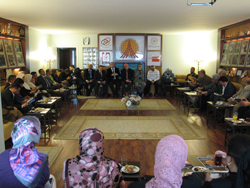From March 31st to April 4th 2009, USIP’s Religion and Peacemaking program, working in partnership with the Council of Representatives’ Religious Affairs Committee, brought together twenty-five religious leaders, civil society activists, and academics from throughout Iraq to discuss religious violence in conflict and how to leverage religious resources in peacemaking. The participants were representative of Iraq’s pluralistic society: hailing from all eighteen provinces, they included both Shia and Suni Muslim, Christian, Yazidi, and Sabean Mandean faiths, Kurdish and Arab ethnic identity, male and female.
Over four-and-a-half days, the participants participated energetically in a program that gave introductory concepts in conflict analysis and avenues for nonviolent conflict resolution, religious dynamics and identity in conflict, religious resources for peacemaking, religious bias, stereotyping, and pluralism, and interfaith dialogue. Participants were especially moved by the USIP-supported documentary the Imam and the Pastor, which tells the story of USIP-partners Pastor James Wuye and Imam Ashefa in Nigeria, former militants who are now actively involved in inter-religious reconciliation.
Image on left: Participants in the religious peacemaking and interfaith dialogue workship in Iraq. View Photo Gallery.
 At the conclusion of the workshop, the participants designed small religious peacemaking and interfaith dialogue projects that they pledged to implement in their local communities. Nine of USIP’s trained Iraqi facilitators who were present at the workshop will assist the participants with these community projects and with other follow-up activities to be conducted at the request of, and in partnership with, the Council of Representatives’ Religious Affairs Committee.
At the conclusion of the workshop, the participants designed small religious peacemaking and interfaith dialogue projects that they pledged to implement in their local communities. Nine of USIP’s trained Iraqi facilitators who were present at the workshop will assist the participants with these community projects and with other follow-up activities to be conducted at the request of, and in partnership with, the Council of Representatives’ Religious Affairs Committee.
Inter-religious relations and religious-based violence are fraught and sensitive topics, but are necessary to address in order to consolidate a sustainable peace throughout Iraq. USIP lauds the enthusiasm and courage of the participants in this workshop who created and will continue to build bridges between disparate communities, and who demonstrated commitment to nurturing inter-religious coexistence not just through word, but also through action.



